The White House's response to the impeachment scandal enveloping Donald Trump – denying, confessing, stonewalling and counter-attacking while implicating others – may appear scrambled, but is backed up by confidence in a "red wall" of Senate Republicans.
The Trump approach is underwritten by an assumption that the two-thirds majority in the Senate required to eject a president just won't happen. The Republicans hold a 53-47 advantage, so at least 20 senators from Trump's party would have to flip to remove him from office.
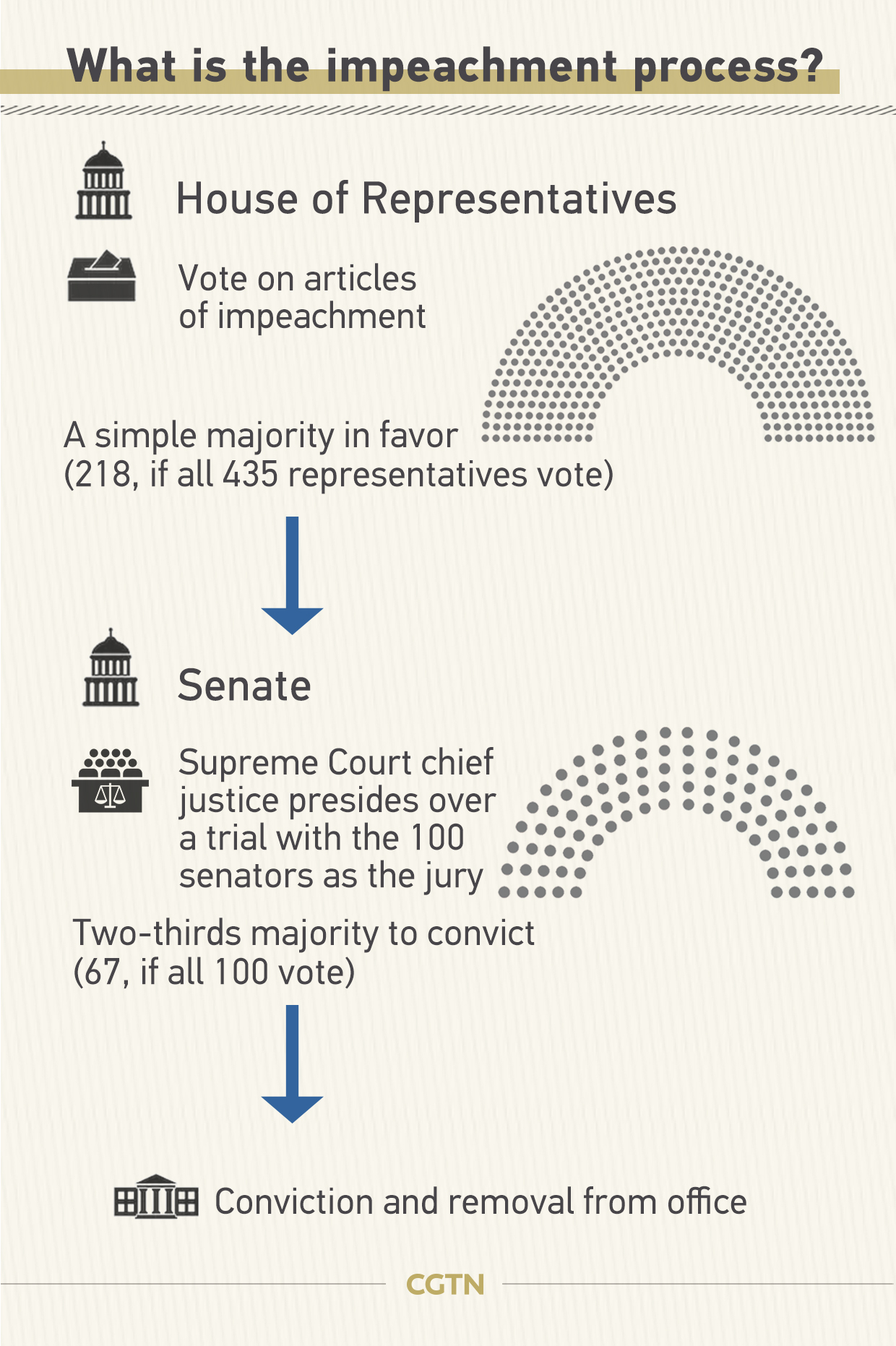
And most Republicans – in fear of criticism from the bully pulpit inflaming opposition among the loyal Trump base of supporters – have been wary of a word out of turn, let alone kicking the president out the White House.
But public opinion can quickly change direction. If the mood in the country shifts strongly against Trump – most importantly among Republican voters – the "red wall" may begin to crumble.
Read more:
Timeline: Trump impeachment controversy
What are the whistleblower's key allegations?
Trump needs only 34 of the 53 Republicans in the Senate to back him in an impeachment trial to remain in office – as many as 19 could vote to remove him, and he would still survive.
At present, 17 Republican senators represent states that Morning Consult polling suggests have a negative view of Trump. Even if they all voted to convict him, the president would remain in the White House.
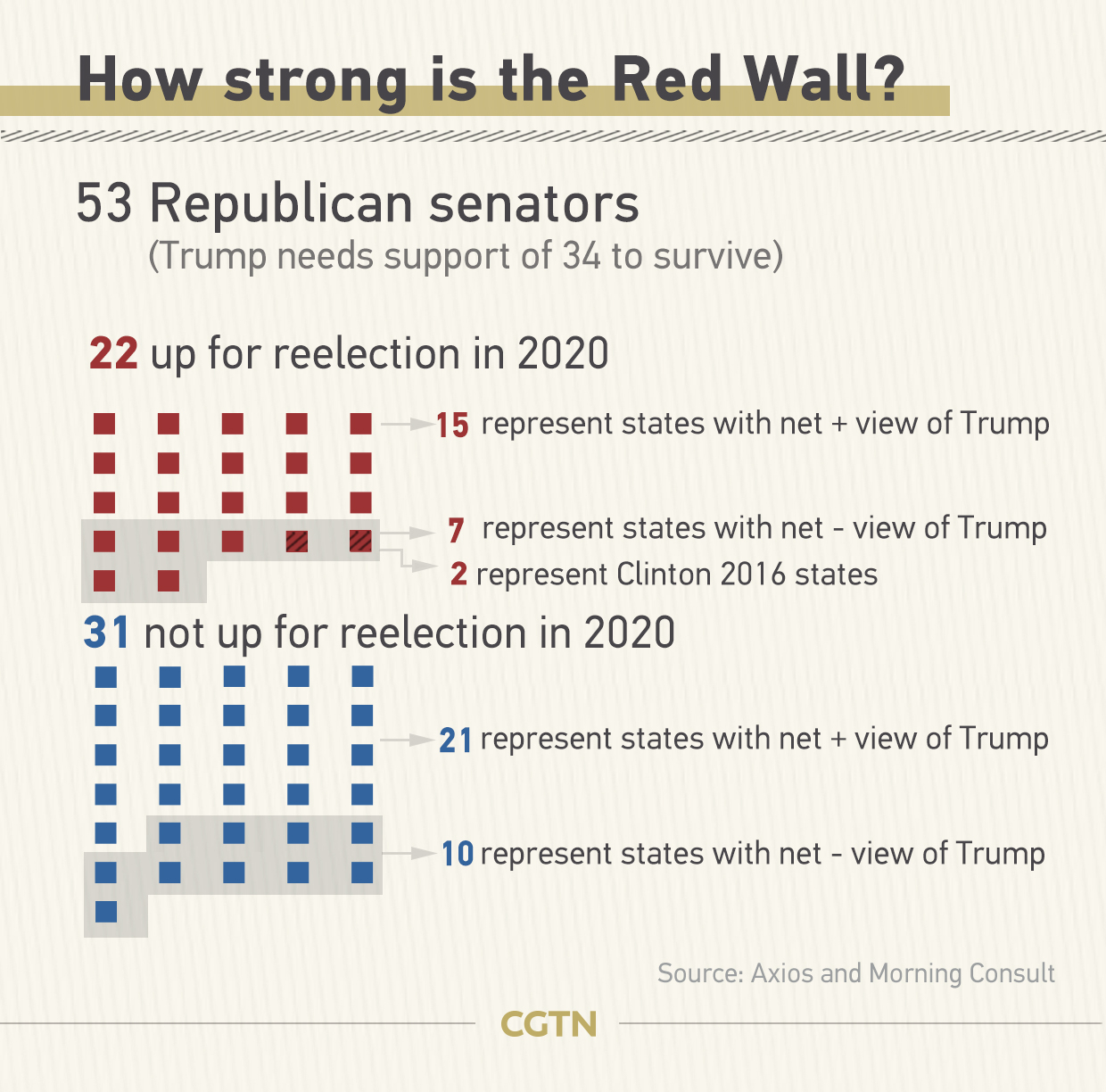
But while the "red wall" appears strong, there are signs of cracks.
Two wildcards are Susan Collins and Cory Gardner, who are both up for new six-year terms in 2020, both represent states that voted for Hillary Clinton in the 2016 election and have so far equivocated on impeachment.
And while many Republican senators have stayed silent, Mitt Romney – and to a lesser extent Ben Sasse – have voiced strong concerns.
Former presidential candidate Romney described Trump's call for foreign powers to investigate political rival Joe Biden as "wrong and appalling" and is reported to have fended off requests from major donors to primary the president. The president responded by calling the Utah senator a "pompous ass."
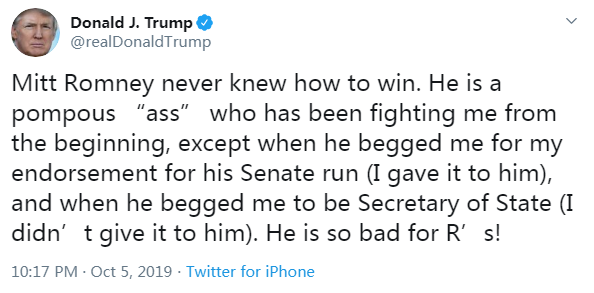
The reaction to Trump's decision this week to pull U.S. troops out of northern Syria is also a sign that there are circumstances in which Republican senators are prepared to oppose the president.
Typically supportive senators, such as Lindsay Graham and even Senate Majority leader Mitch McConnell, have spoken out, and reporting from CNN suggests Trump is worried, making three phone calls per day to McConnell to shore up party loyalty.
Ultimately the number of loyal senators will likely be determined by another set of numbers: Public opinion. So how does the American public view impeachment?
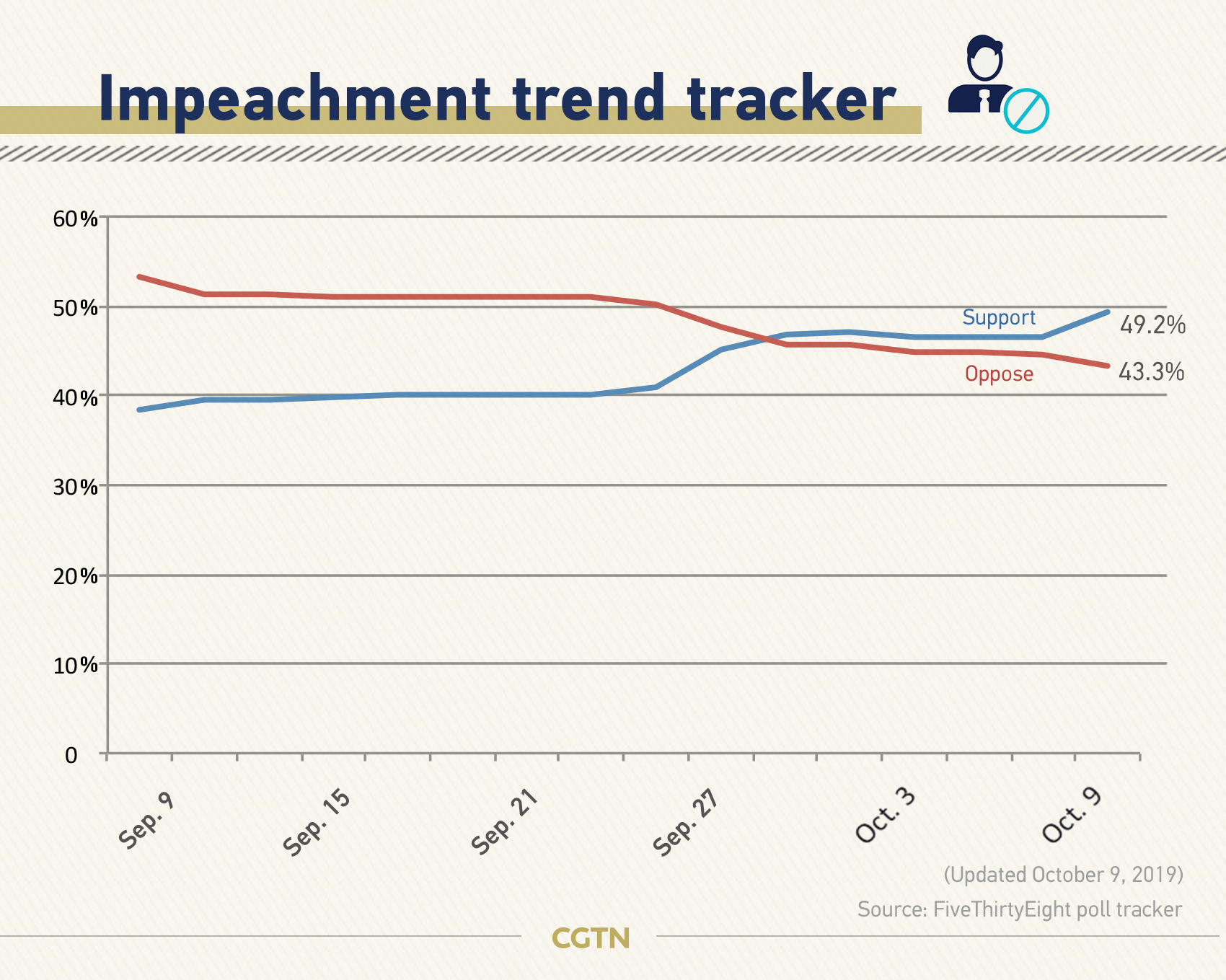
Polls show a clear and swift trend in favor of impeaching Trump since revelations about his controversial phone call with Ukrainian President Volodymyr Zelensky emerged and a drip feed of other allegations followed.
FiveThirtyEight's impeachment poll tracker, an aggregator of polls, indicates that on September 19, just before the Ukraine story gained traction, 40.1 percent of Americans backed impeachment and 51.0 percent were opposed.
Over the following three weeks, as details of the Trump-Zelensky call and the whistleblower claim were released to the public, the picture has changed dramatically. By October 9, 49.3 percent backed impeachment and 43.3 percent were opposed.
Individual polls in recent days also suggest growing approval for removing Trump from office. A Washington Post-Schar School survey released on Tuesday indicated 49 percent favored removing Trump, while a Fox News poll published on Wednesday suggested 51 percent backed the same option.
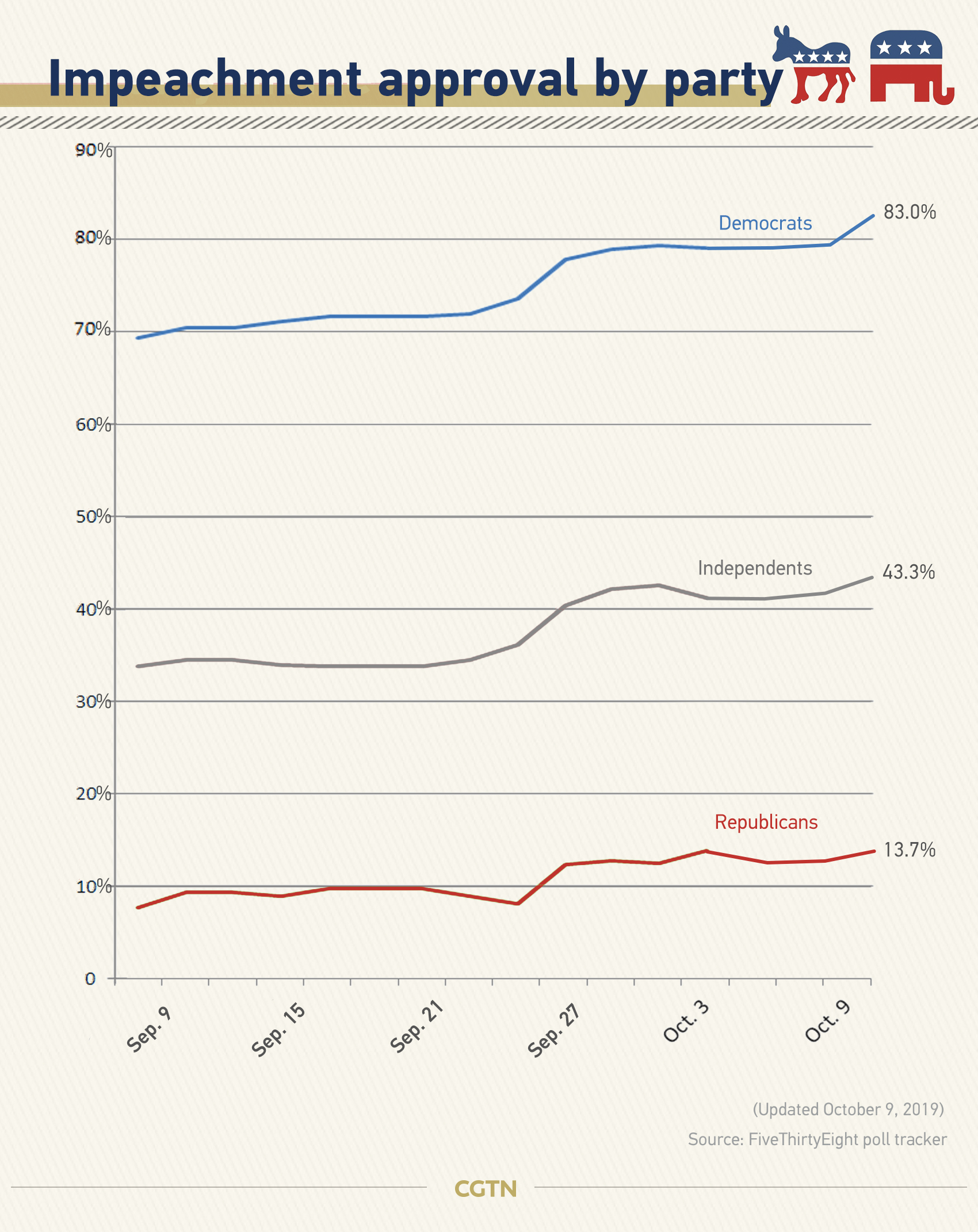
Democrats have unsurprisingly rallied behind their party's impeachment stance, but that support has little bearing on Trump's "red wall." If Republican senators do respond to public opinion, it'll be the views of their potential voters that sway them.
The FiveThirtyEight tracker suggests that support for impeachment among Republicans remains low and backing among independents is below the overall number in favor. However, the polling also indicates that support for impeachment is trending up in both groups.
On September 19, 37.9 percent of independents and 9.7 percent of Republicans backed impeachment. Three weeks later, on October 9, those numbers had jumped to 43.3 percent and 13.7 percent respectively.
This week's major individual polls also have worrying findings for the president: Both the Washington Post and the Fox polls suggest the numbers of Republicans in favor of impeachment is rising, with the former revealing stronger backing among younger and moderate Republicans.
The key question for Trump is whether these numbers continue to trend up – if they do, it would spell trouble in either an impeachment trial or an election.
But the sustainability of the numbers is unclear. The impeachment inquiry is moving forward rapidly with a flurry of subpoenas, depositions and media stories, but the White House is refusing to cooperate and Trump and his surrogates are counter-attacking fiercely and spending heavily on TV ads.
The numbers may wane if the waters are muddied, momentum slows and Democrats fail to make a clear case.
Importantly, Trump's approval ratings suggest that even as support for impeachment grows, the president's core support remains behind him.
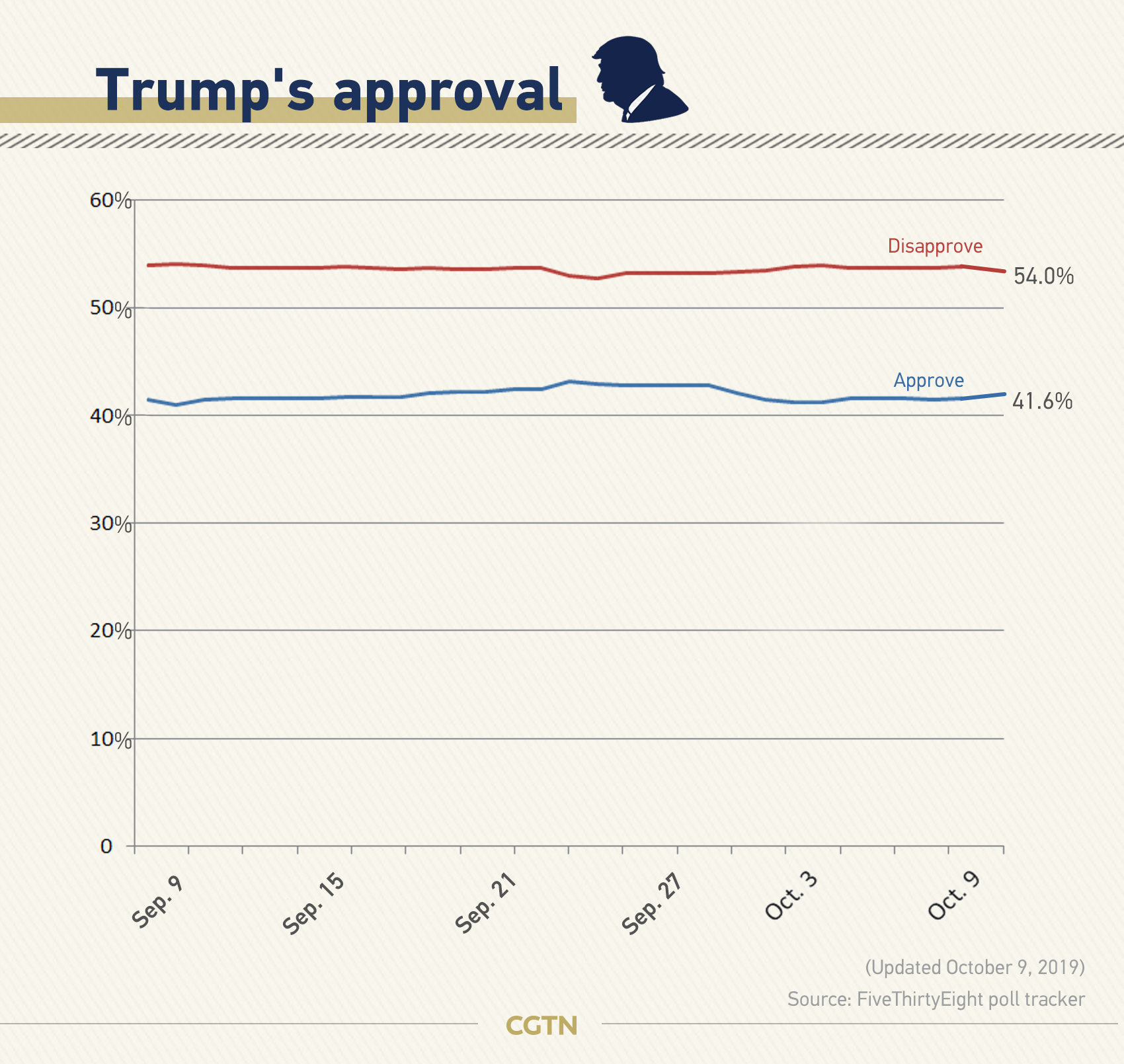
The president's approval rating has varied little from a 40-42 percent range over the past year, according to a FiveThirtyEight tracker, and since the impeachment inquiry was launched the change has been minimal.
On September 19, 42.1 percent of Americans approved and 53.7 percent disapproved; on October 9 those numbers were 41.6 percent and 54.0 percent respectively.
The numbers are historically low and spell danger going into the 2020 election, but the impeachment inquiry doesn't appear to have moved the dial, suggesting that Trump's base is unmoved in its support.
This is the good news for Trump: So long as this group remains supportive, he can use his influence with them to push senators for loyalty.
Another positive for Trump is the sign that one part of his gamble is paying off: Joe Biden, the rival Trump wanted investigated, has been hurt by the scandal, dropping into second place behind Elizabeth Warren in the race for the Democratic 2020 nomination.
The bad news is that public opinion is trending away from the president, and that will be a major problem over the next 13 months if sustained.
If momentum slows and reverses, Trump will be confident that his base and "red wall" remain in place. If the trend continues, the loyalty of Republican senators cannot be taken for granted.
(Graphics by Zhang Xuecheng and Li Wenyi)